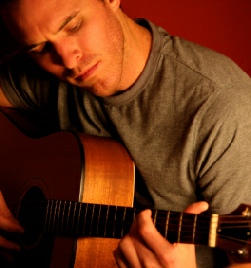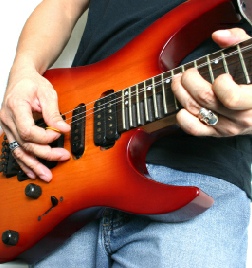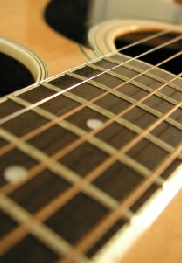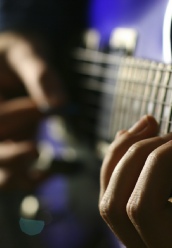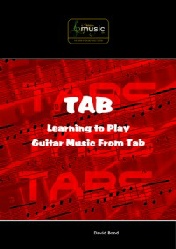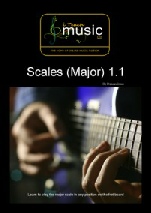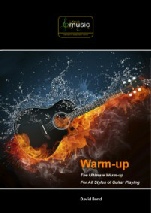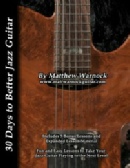

| Terms of Use | Privacy Policy | Teachers Wanted | Downloads | Legal | Returns Policy | Prize Rules |




Internet Guitar Lessons
Professional Lessons
At Affordable Prices









Free guitar lessons
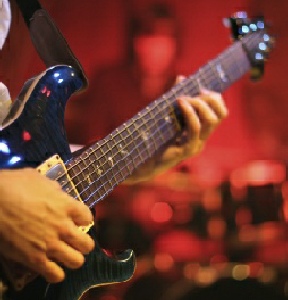



Learn from the best teachers around the world from the comfort of your own home
Featured Teachers
- Bill Hart
- Duncan Jones
- Emrys Baird
- Jim Covington
- Colin Cartmell
- Daniel Realpe
- Simon James
- Pauric Mather
- Niels Vejlyt
- David Bond
- Matt Warnock
- Dylan Kay
- Andrea Basiola
- MDS
- Carlos Viegas
- Matt Pearce

Learn the following styles:
- Rock
- Blues
- Country
- Classical
- Jazz
- Jazz Fusion
- County Rock
- Pop
- Bluegrass
- Slide
- Heavy Metal
- Shred

E-books Available from our shop:
- Deryl Gabel
- David Bond
- Duncan Jones
- Matt Warnock
- Pauric Mather

Blog
We have an extensive range of blog articles from guest writers such as:
Tom Hess
Andrea Basiola
Colin Cartmell


How To Develop Creativity In Your Guitar Playing - Part 1
by Tom Hess
Do you struggle with becoming a more creative and self expressive musician? Many guitarists run into this problem as they begin to feel more comfortable with the physical aspects of their guitar playing. A lot of musicians can't seem to write songs or create their own guitar solos at the same level as they can "play" their guitar. Their music sounds stiff, uninspired or not very creative and expressive. If this describes you, then this article will help you to identify the causes of why this problem exists in your guitar playing and will show you the steps you need to take to overcome it.
That question of how one can become a more creative guitar player is a very common one that I (and probably most guitar teachers) am very often asked. Before I go into detail to answer it I need to say that in order to completely overcome such a problem will require one to work at it for a long time. And I strongly suggest working with an excellent teacher to help you through this. He/she will save you a lot of time, effort, aggravation, etc. (Refer to my previous article on "How To Choose A Guitar Teacher".)
Most players have, at some time in their musical development, felt uncreative, uninspired or otherwise not very expressive musically. Fortunately, there are several things that can help one get over this. The first (and the most critical) thing to realize is that the problem lies in lack of creativity as a "musician" rather than as a "human being". We are all creative and expressive as people (that's a big part of what makes us human). When it comes to your ability to express your innate creativity through your guitar, the problem lies in lack of mastery over several fundamental musical skills. Typically the issue is caused by a combination of factors such as those in the following list:
Aural Skills (Ear training) Problems
- Not listening closely enough to recognize consonance and dissonance.
- Not knowing how to use and control dissonance aurally.
- Not knowing what notes and chords are going to sound like before you play them!
- Not being able to aurally (by ear) understand the emotional function of each individual pitch in a scale and a chord.
Guitar Technique Problems
- Not having enough physical technique developed on your instrument to do the types of things that will allow you to be creative. If you are severely restricted musically by what your hands are able to do (or rather, what your hands are not able to do), it will be physically hard (or impossible) to do certain creative things.
- Not knowing how or when to control your technique.
- Thinking too much about what your hands can do instead of what you want them to be able to do in order to execute your creative possibilities.
Music Theory Problems
- Not knowing your fretboard well enough so that you don't need to think about where the notes are as you are playing, improvising and writing music.
- Not having memorized all the notes in the key(s) you're working with.
- Not knowing what notes are in what chords.
- Not knowing what notes are consonant and what notes are dissonant in any given situation (and more importantly, how to control dissonance in music theory!)
If you have any of the above problems, work on fixing them because those things, although not really elements of creativity itself, are the basic skills that one must possess to be creative/expressive on an instrument. The human mind is amazing and can do several simultaneous operations, but the more things you ask your mind to do at the same time, the more difficult it becomes to do any of them well. To really be creative and musically expressive, you need as much of your conscious brain energy as possible to be concentrating on being creative/expressive. If you don't really understand what notes you can use in a given situation to produce desirable results, and at the same time your mind has no idea what the notes are going to sound like before you play them, and at the same time, you are struggling with the limitations of what you can physically play, and at the same time, you don't know how to control dissonance, etc., how much conscious brain power do you actually have left to think about improvising an expressive guitar solo, create an original melody, or to write a song with new ideas? I would bet that the majority of those of you reading this have this problem to some extent. I suggest to make it a priority to get these basic skills under your belt as soon as you can.
Once you have (or if you have) a good amount of control over the basic musicianship skills, you are ready to go deeper into the creative aspects of playing / writing.
I usually find that my most creative musical ideas don't come from thinking about music at all. I look at other forms of art (and nature) to find new ways to see creativity. Once I have an interesting idea or concept in mind, I look to find all the possible ways that I may be able to adapt that into musical form to suit my musical needs. Following is an example of what I am talking about.
A few years ago I began thinking about the similarities and differences in the different processes that are used in separate art forms (painting, music, poetry, stone or marble sculpture, etc.) Of the four I just mentioned, only stone cut and marble cut sculpture starts with something (the raw materials of stone or marble) and then the artist destructively eliminates materials to create the art. Poetry, music and painting generally are created from nothing (no materials from which to take away from) thus the artist creates the art constructively (adding materials such as letters, words, musical pitches, rhythms, brush strokes of wet paint, etc.). I once made this simple analysis of the stone sculpture process, I knew that its importance would be significant and valuable to me eventually. After almost a year of thinking about a way in which I could apply the principle of destructive creation (versus constructive creation), I finally had some brand new ideas (at least they were brand new ideas to me) for a new creative way (process) to write music. I found ways to apply this to general musical compositional processes and form. I'm sure there are more ways to apply the principal that I have not yet thought of. If I told you my own discoveries it might hinder you from discovering your own and going beyond what I was able to do. I encourage you to think deeply about how you might be able to apply destructive creation into new musical writing processes.
Another example of taking creative processes from other forms came when I was watching a Disney movie on DVD. There was a special features section after the movie on the DVD in which the film makers showed diagrams and charts called story boards. The purpose of these story boards was to communicate more clearly the ideas from the writers and producers of the movie to the artists who were creating the animation for the film. I thought about how this might be applied to my advantage when writing the music for my "Opus 2" CD. Since I had in my mind all of the things I wanted to express in the music, I used this story board technique to better communicate between the right side of my brain and the left side of my brain. I charted out with diagrams, charts, elemental lists, etc. all of my non musical ideas (emotions, thoughts, ideals, experiences, etc.) that I wanted expressed in the music. The plans were much more organized now, I could clearly see what I wanted to be expressed at what moment during the music. This helped to keep me on track musically. I was very pleased with the final result. There many other processes that I used in composing "Opus 2" (and "Opus 1"), but this general principal is one that I think any composer or songwriter can use no matter how advanced or basic one's music writing skills are.
As the previous example illustrates, I typically think about what I want to express before I think about writing the music. That is something that surprisingly not a lot (probably most) songwriters don't really do much (especially in the non classical music world.) I'm not saying that my ways and processes for writing music are better than someone else's way (because I believe all methods are legitimate), I'm just offering here one of my ways of composing which may be a new approach for you.
Tom Hess is a highly successful guitar teacher, professional touring guitarist and recording artist. He plays guitar in the band Rhapsody Of Fire and teaches guitar players around the world via rock guitar lessons online. Visit tomhess.net to get free guitar playing tips, assessments, surveys, mini courses and to read more guitar playing articles.
Musical Creativity And Expression - Part 2
by Tom Hess
Since writing part 1 of the "Musical Creativity And Expression" article series, I have received a LOT of e-mail from readers about one of the examples I discussed (the idea of the story board). Many of the readers wanted me to go into more detail of how this idea can be applied to songwriting. With that in mind, here is a songwriting assignment for you to do.
For this composition, I strongly suggest to write an instrumental piece of music (song with no words or singing). My reason for this is simple, most writers rely too heavily on the lyrics of the song to express the thoughts, feelings, emotions, story, etc. that is being communicated. Certainly there is nothing wrong with the lyrics telling the story, but I think it’s a lot more valuable if you can tell the same story with the music alone. Then when you add the lyrics (if you add them at all), the power and impact of the song will be much greater on the listener. So let's focus this experiment only on the music and not on the lyrics. You can always add lyrics later once you are done if you want to.
Select your topic. Find something that you want to express musically. You can choose anything you want such as: a personal event, feeling, thought etc. from your own life, or a story that you heard about or read about, or you can create a fictional story, event, etc. to use. The key is to know exactly what it is that you are going to be expressing before you begin to even think about writing music. What are the expressive goals? Why have you chosen this topic to express in music?
Write it down. Once you have chosen your topic, write it down on paper in your own words in a few paragraphs. You will be coming back to this written description of your topic over and over again as you are writing the music, so keep this close by you when you are working. Describe (in writing) the events, feelings, thoughts, the people, places or things involved, etc. Remember what your expressive goals are?
Divide into sections. Divide story/topic into sections. The number of sections will vary depending on many factors that are all based on your story. For most songs, 3-8 sections are typical but more less are possible. The sections of your story/topic will determine the number of musical sections of your song, so think about this carefully. Number each section.
The 7 basic elements of music. Make a list of the 7 basic elements of music. Then think about how each musical element (rhythm, harmony, melody, texture, form, timbre, dynamics,) can best be used to express your expressive goals (your story/topic) into music. Really think about each element, don't just rush through this step. Write down your ideas about each on the same paper that you prepared in step 2.
Climax. Think about where the climatic points in your topic/story are. Which section is the main climatic point in? At specifically what point in that section is the climax located (beginning, middle, end. etc.) It may be a good idea for you to compose the climatic point first even if it's the middle or end of the story. If you know where you are going, it’s going to be a lot easier for you to get there. In most stories, parts before the climax build up to the climax and parts after the climax generally move away from it. In other words, what happens before the climax usually creates tension and what happens after the climax usually creates resolution of all the built up tension. Of course not all stories or music follow this pattern, but often times it does. Write down your ideas about each on the same paper that you prepared in step 2
Now that you have all of this down on paper, you are ready to begin writing the actual music for your song/composition. As you are writing the music, go back to your original ideas that you wrote down on paper in steps 2-5. Are you following your original ideas or have you begun to evolve away from them as you are writing the music? It's common for me to sometimes get away from my original intentions once I am composing the music and have been working on the piece for a while. Sometimes the result of changing the plans works out to be even better than the original, but sometimes it is a failure and I go back to the original concepts and rework the music to better fit my intentions. For the purpose of learning this way of writing music, I encourage you to stick with your original plans for now no matter what. After you feel more comfortable with writing/expressing yourself in this way then certainly you can evolve out of this compositional style when it best suits your own needs.
About The Author:
Tom Hess is a very successful online guitar teacher, recording artist and a member of the band Rhapsody Of Fire. He teaches guitar players around the world in his online guitar lessons. Visit tomhess.net to get free guitar playing resources and to read more guitar articles.

